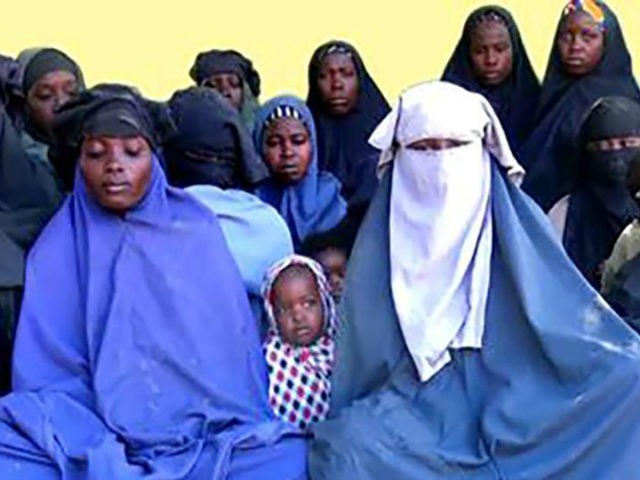A Boko Haram commander released last year in exchange for 82 abducted schoolgirls resurfaced in a video this week, boasting of the jihadi group’s control of northern Nigeria’s Sambisa Forest and mocking government claims that the group has been defeated.
The video surfaced less than a month after Boko Haram terrorists attacked a secondary school in Dapchi, Yobe state, kidnapping over 100 girls. Critics of the government’s policies of paying ransom or freeing terrorists in exchange for the girls contend that abductions will not only continue, but increase as the Islamic State affiliate leverages the policy to their benefit.
In a video obtained by the outlet Sahara Reporters, Boko Haram commander Shuibu Moni claims to be living comfortably in the Sambisa forest, for years Boko Haram’s stronghold in its home state, Borno. Moni, speaking in Arabic and Hausa, states that the terrorist group is thriving and that any reports that the Nigerian military has taken control of the Sambisa forest are untrue. While the video surfaced on Wednesday, it is not dated.
FLASH VIDEO: Boko Haram commander, Shuibu Moni, who was released in a swap deal in exchange for #Chibokgirls appeared in a new video, threatening more violence against Nigeria and claimed that his group is still firmly on ground inside Sambisa forest. pic.twitter.com/qB3wBlKldx
— Sahara Reporters (@SaharaReporters) March 7, 2018
The Nigerian government announced the May 2017 release of 82 girls kidnapped in 2014 from Chibok, Borno. The Chibok abductions, which numbered over 200, made Boko Haram a household name and played a significant role in the election of Muhammadu Buhari president, who promised to use his experience as a military dictator to eradicate the terrorist organization. At the time, Nigerian officials gave scant details about the terms of the release of those girls, though reports suggested that the government offered the release of Boko Haram terrorists and ransoms in exchange for the girls. Moni is reportedly among the individuals released in exchange for the hostages.
The Nigerian government has responded to the video by claiming that the military will soon capture Moni once again.
“The troops that captured him are still in the northeast, and they will get him,” army spokesman John Agim told CNN on Thursday. “He was captured before; he can be captured again.”
The video has triggered an outcry from those critical of the government’s policy of enriching and liberating terrorists in exchange for hostages.
“We are calling on the international community to look beyond Boko Haram or herdsmen. The international community should come for a fact finding as well as dig deeper into the killings in Nigeria,” Ekiti state Governor Ayodele Fayose said on Thursday. “How would you want us to believe that the Nigerian army cannot engage herdsmen or Boko Haram? It seems that the reason for the coming of President Muhammadu Buhari to secure Nigeria has been defeated in all areas, including corruption and fight against Boko Haram to secure Nigeria among others.”
“Nigeria must realise that if we fail to challenge the government on this, it would be a sad story for the coming generation,” Fayose insisted.
A former aide to Goodluck Jonathan, Buhari’s predecessor and the first person in Nigerian history to peacefully hand power over following an election, made similar remarks.
“The fact that a Boko Haram commander released by the Buhari government can threaten Nigeria proves that you should not negotiate with terrorists or pay ransoms to them. By doing so, you become the major financier of terrorism knowingly or unknowingly!” Reno Omokri wrote in an article published in African media. “Terrorists cannot be trusted and any negotiation or ransom payments will only come back to haunt you as we have seen in Mr. Moni’s latest video.”
Several security experts told Nigeria’s Premium Times magazine that this policy is, indeed, strengthening Boko Haram, which Buhari claimed to have defeated in a 2015 BBC interview.
“The government has unwittingly allowed the group to regroup by, firstly, negotiating with them, and in the process allowing them some kind of funding—though I am not certain about this; as well as allowing them (recover) some of their members who had been in detention”, security risk consultant Kabiru Adamu told the newspaper.
Ahmed Abdullahi, a former official in Borno, predicted to the Premium Times that the girls kidnapped from Dapchi this year will “further fetch more Euros to the current callous commanders (of Boko Haram) and security managers who have no sincerity of purpose.”
The parents and relatives of those girls, estimated to be about 110 of them, traveled from Yobe to Abuja on Thursday—International Women’s Day—to encourage the Buhari government to work harder to free their girls. The relatives have joined forces with the Bring Back Our Girls campaign, founded to advocate for the Chibok hostages, to petition the government to ensure their safe return.
The Nigerian government initially denied the Dapchi abduction in February, then claimed they had rescued all the girls, triggering a mob attack on police forces and Yobe Governor Ibrahim Gaidam. The government ultimately confirmed what parents and school officials had told them from the start, while Gaidam condemned the federal government for withdrawing troops from the area a week before the attack, leaving the schoolgirls vulnerable.

COMMENTS
Please let us know if you're having issues with commenting.